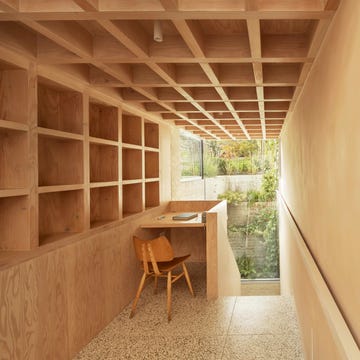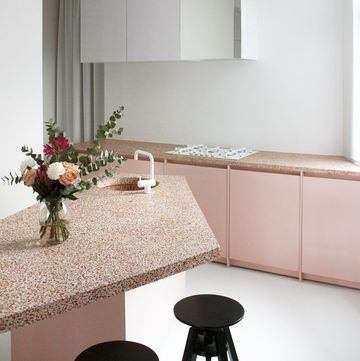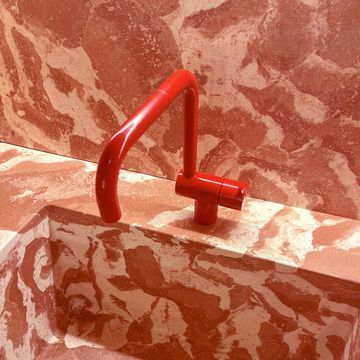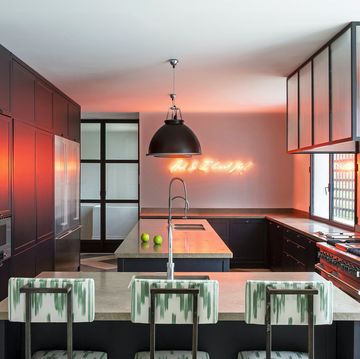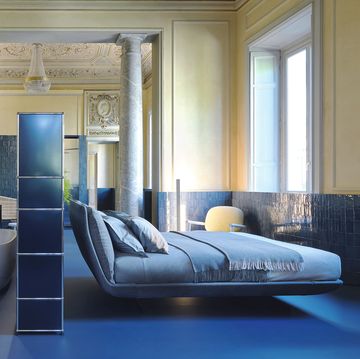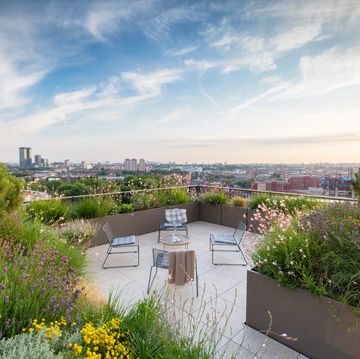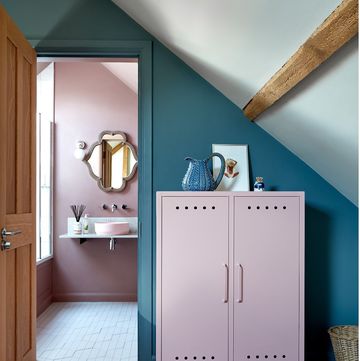It’s the most-used part of what’s undoubtedly the hardest-working room in the home, but with so many options available, picking a material can be tough. Here, we weigh up the merits of our top nine – porcelain, stone, composite quartz, laminate, solid surface, wood, copper, ceramic and recycled plastic – to help you make an informed decision.
Porcelain
Porcelain is an affordable option that’s also hard-wearing and food-safe. It’s scratch and stain-resistant – so you can chop directly onto the surface – and can withstand high temperatures. It’s also non-porous, making it easy to keep clean. Opt for a matte finish over highly polished, since polished can become marked over time, although it still offers more stain resistance than marble or concrete.
‘Advances in digital printing can even produce “natural” variations from tile to tile, meaning it’s indistinguishable from the real thing,’ says Jo Oliver, director at Stone & Ceramic Warehouse. ‘This makes it possible to achieve the look you want at a lower cost and without the challenges and maintenance issues that come with materials such as marble and limestone.’
What's everyone reading?
How to use
Ultra-large slabs up to 160 x 320cm mean fewer or no grout lines, which in turn gives a sleek, seamless look, while sheets are available from as little as 3mm thick, which taps into the trend for super-thin surfaces. Porcelain can be used to clad the front of cabinetry, and due to its excellent durability, it works well as flooring, too.
Brands to know
Stone & Ceramic Warehouse stocks matt and silk slabs in a wide range of finishes. From £240 per m sq, stoneandceramicwarehouse.co.uk
Italian firm Florim has almost 60 years’ experience and offers natural stone, wood, cement and metal effects as well as plain colours. Price on application, florim.com
Developed with the University of Milan, SapienStone’s ‘Active Surfaces’ are antibacterial and antiviral, and pollutants including VOCs are neutralised. From £354 per linear m, sapienstone.com
New advances in technology mean that the range of porcelain optionshas exploded in recent years. Italian manufacturer Marazzi uses 3D printing to produce the convincingly delicate veining and realistic texture of its new marble-effect ‘Silver Root’ design. Not only are the tiles reassuringly antimicrobial, they are also slip-resistant, so your chopping board won’t shift about unnecessarily. Price on application, marazzi.it
Stone
A volcanic-lava stone worktop is tremendously versatile; durable and heat-resistant, ages beautifully and is easy to maintain. Granite and basalt are also good options. Those looking for a luxurious finish may gravitate towards marble and limestone, but be aware that they are less forgiving and prone to staining. Whatever variety you choose, stone always needs to be handled by an experienced installer.
‘A key consideration is that each piece is unique, so can vary in appearance,’ says Hege Lundh, marketing director at Lundhs. ‘This is part of its beauty, but it’s important to make sure you’re happy with the exact slab.’
How to use
Stone must be handled by an experienced installer. Weight and access can be an issue with big slabs, so make sure you plan ahead. Most stone is sealed before fitting and chopping boards should be used to protect knives as well as the surface itself.
Brands to know
Lundhs offers four varieties of 100 per cent natural Norwegian stone in silk matte and polished finishes. Each piece is delivered with a certificate of authenticity. From £680 per m sq, lundhsrealstone.com
Italian company Antolini supplies an impressive range of more than 1,300 of the finest stones, including marble, granite, onyx and travertine, as well as offering ‘Azerobact Plus’, an antibacterial treatment that prevents bacteria forming. Price on application, antolini.com
Quartzite and granite are quarried options that offer a simpler cleaning regime than the temperamental likes of marble (which is easily stained by coffee, wine and citrus fruits). Porcelanosa, also known for its ‘Krion’ and ‘XTone’ composite surfaces, is an expert in these stones. For dramatic organic pattern, choose its ‘Alpinus’ design that has a familiar earthy shade and flecks of crystals. Price on application, porcelanosa.com
Finally, Made a Mano sources Italian lava stone from Mount Etna in Sicily. As well as natural stone, glazed options are available, which are fired at extreme temperatures so it can’t fade or chip. From £1,218 per m sq, madeamano.com
Composite quartz
Quartz worktops are engineered from minerals that are moulded with resins and pigments to make a resilient surface that’s stronger than marble and granite. It can be designed to imitate natural stones in a variety of speckled and flat colours, as well as different finishes. ‘Quartz is exceptionally hardwearing, non-porous and resistant to cracks, scratches and stains, so does not require sealing,’ says Jon Stanley, VP of marketing at Caesarstone. It can be easily cleaned with soap and water.
How to use
Supplied in large slabs, quartz needs to be templated, cut and installed by a specialist fabricator. Worktops can be formed with decorative edges, deeper surfaces built using mitred joints, and kitchen islands can be wrapped with the material to create a monolithic look. Low maintenance, quartz works well as cladding and as flooring, too.
Brands to know
Spanish surface company Cosentino is one of the forerunners in composite worktops. It has just released ‘Earthic by Silestone XM’, a new surface collection by design duo Formafantasma in collaboration with Cosentino. It is formed using discarded fragments of PET plastic from existing surfaces in its range by Dekton and post-industrial glass, bound by an innovative bio-resin. From £200 per sq m, cosentino.com
Caesarstone, an expert in this type of surface, has also reduced the amount of silica (the dust from which is dangerous to humans and the environment) in ‘Time’, its new collection. The neutral ‘Solenna’ is a timeless choice. From £650 per sq m, caesarstone.co.uk
Laminate
The most affordable option of all, laminate is a dense surface formed using compressed layers of paper and resin bonded to a chipboard core. It can emulate the look of any other material, from wood to marble, and comes in a huge range of plain colours. Edges are post-formed, so there are no seams, which makes it easier to clean, and laminate is also resistant to impact, heat and scratches.
‘Designs have really evolved, and there is now a huge selection of contemporary plain, patterned and realistic finishes such as wood, concrete and stone that give the appearance of the material without the maintenance issues,’ says Caroline Elliott, Head of Product UK Worktops for Wilsonart UK.
How to use
Laminate worktops are easier to move and cut than most other materials and can be fitted as part of a regular kitchen installation, saving on time and cost. Most brands offer matching upstands and splashbacks to create a sense of cohesion.
Brands to know
Formica has been producing laminate for over 100 years. Its range spans hundreds of colours and effects including new abstract patterns, plaster-look and ultra-matte finishes. From £190 for a complete worktop, formica.com
A contemporary option, Fenix offers soft touch, anti-fingerprint and metallic-effect surfaces with very low light reflectivity. Price on application, fenixforinteriors.com
Bushboard’s range boasts added antibacterial protection that destroys 99.9 per cent of bacteria within 24 hours. Price on application, bushboard.co.uk
Recycled Plastic
Plastic worktops are now a relatively easy-to-install and inexpensive cut-to-size option. The plastic is typically recycled from waste soap bottles, caps, spools or even old fridges and is available in translucent or solid colour options with speckles.
How to use
Recycled plastic usually comes in panels that come in a huge range of size and various thicknesses to adapt to countless applications. The plastic is recycled from waste soap bottles, caps, spools, old fridges and is available in translucent or solid colour options. The applications are endless: from interior and exterior furnishings to shelves and coverings, up to furnishing accessories and design objects.
Brands to know
Italian startup Plastiz was born as a response to the environmental and social emergency resulting from the growing invasion of plastic waste. Its 100 per cent recycled panels (‘VSK+Stamuli Pink’ pictured) is a conscientious but fun choice. From approx £205 per sq m, plastiz.it
Solid surface
Solid surface is a composite material made from minerals, acrylic polymer and natural pigments that are formed into a smooth, tactile product.
Worktops are non-porous, ultra-hygienic, impenetrable to mould and available in a virtually limitless range of colours, including solid hues, natural stone designs and even translucent shades that can be backlit to create a soft glow.
Stain- and scratch-resistant, small marks can be polished out with an abrasive cleaner, and although heat-resistant, trivets are recommended with hot pans.
How to use
This versatile material can be formed to include curved edges, integrated sinks and splash backs and joined to create a visually seamless expanse. It must be fitted by specialist installers and, like timber, it can also be sawn, routed, drilled, sanded and engraved, and used as wall-cladding as well as on horizontal surfaces.
Brands to know
Corian comes in 65 colours suitable for kitchens, many available with veining and graining, while the ‘Corian Charging Surface’ has a charging unit integrated in the worktop. From £410 per sq m, corian.uk
HI-MACS is made using new-generation technology that creates denser, even more durable surfaces and is available in 111 colours and finishes. From £300 per linear m, himacs.eu
Wood
Warm and naturally antibacterial, a wooden surface makes for a seamless transition between the kitchen and the rest of the home. Wood is also kinder on crockery and creates gentler acoustics than harder materials.
Choose from a huge range of species including oak, walnut, iroko, maple, ash, sapele and cherry, to name but a few. You get what you pay for: cheap timber deteriorates quickly, as does a poorly finished worktop; always choose FSC-certified wood, fit and seal it properly and it will last for years.
How to use
Wood is easy to install but will benefit from an experienced fitter for a good result. Surfaces should be oiled regularly but will resist staining as long as spills are wiped immediately, and scratches and stains can be sanded out. Timber is best avoided in very wet areas such as directly around a sink.
Brands to know
Naked Kitchens’ ‘SuperStave’ worktops feature continuous planks that run the entire length of the surface to show off grain. A unique nano coating treatment adds extra protection. From £500 per linear m, nakedkitchens.com
Dinesen offers a range of handsome timbers suitable for worksurfaces including Douglas fir, ‘HeartOak’, ash and pine. From £65 per m sq, dinesen.com
Ikea’s range of complete wood veneer worktops are all ready to take away. From £120, ikea.com
Of course, you could invest in a traditional wooden worktop, but we’ve been inspired by the modernity of Foresso’s surfaces, which are produced using waste wood sourced from felled trees and offcuts from local sawmills and building sites. The wood chips are bound using a mix of waste minerals, wood dust and a non-toxic glue, then hand-finished in the brand’s Birmingham workshop. From £875 per sheet, foresso.co.uk.
Ceramic
Known for its durability and creative potential, ceramic is one of the oldest man-made materials. Worktops are made from modified clay to resemble a solid stone such as granite or marble. Sleek, contemporary and low-maintenance, ceramic is a relatively luxurious choice, but it’s worth the investment as the non-porous surface is resistant to scratches, stains, heat and mould. It is easy to clean and doesn’t need sealing, but can be slightly more prone to chipping than quartz.
How to use
A ceramic worktop can be tooled with details such as drainage channels and you can even specify an integral ceramic sink for a stylish and practical look. Always use an experienced fitter to install your ceramic worktop; the material is extremely rigid (that’s why it’s so durable) so if it’s not fitted precisely there is a risk of it cracking.
Brands to know
Top Safety is the new range of antibacterial ceramic slabs for kitchen countertops from renowned Italian brand Marazzi, marazzigroup.com
Atlas Concorde has an extensive offering of ceramic options. It’s new ‘Boost’ tiles are inspired by the colours and qualities of raw earth, for a velvety finish that’s akin to concrete or clay plaster. The collection comes in eight neutral hues – the light, oaty beige of ‘Ecru’ (pictured) lends an on-trend warmth. From £54 per sq m, atlasconcorde.com
















